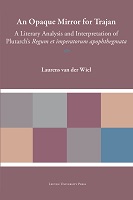An Opaque Mirror for Trajan
A Literary Analysis and Interpretation of Plutarch's 'Regum et imperatorum apophthegmata'
Abstract
The first full in-depth analysis and interpretation of Plutarch’s Regum et imperatorum apophthegmata in its entirety as a literary piece of art.
Plutarch’s Regum et imperatorum apophthegmata (Sayings of Kings and Commanders) holds a peculiar position in his oeuvre. This collection of almost 500 anecdotes of barbarian, Greek, and Roman rulers and generals is introduced by a dedicatory letter to Trajan as a summary of the author’s well-known and widely read Parallel Lives. The work is therefore Plutarch’s only text that explicitly addresses a Roman emperor and is likely to shed light on his biographical technique. Yet the collection has been understudied, because its authenticity has been generally rejected since the nineteenth century. Recent scholarship defends Plutarch's authorship of the text, but some remain sceptical. This book restores its reputation and provides a first full literary analysis of the letter and collection as a genuine work of Plutarch, wherein he attempts to educate his ruler by means of great role models of the past. Plutarch’s thinking about the function of role models (exempla) is not only relevant for Plutarchan research, but also for our knowledge of exemplarity, a key feature both in Greek and Latin literature in the early imperial period in general. Therefore An Opaque Mirror for Trajan is also of interest for literary and historical scholars who study the broader context of ancient literature of the first centuries CE.
Ebook available in Open Access.
This publication is GPRC-labeled (Guaranteed Peer-Reviewed Content).
Keywords
Plutarch;Trajan;Exemplary literature;Apophthegms;Anecdote collectionsDOI
10.11116/9789461665355ISBN
9789462703902, 9789461665355Publisher
Leuven University PressPublisher website
https://lup.be/Publication date and place
Leuven, 2024Grantor
Series
Plutarchea Hypomnemata,Classification
Ancient Greek and Roman philosophy


 Download
Download